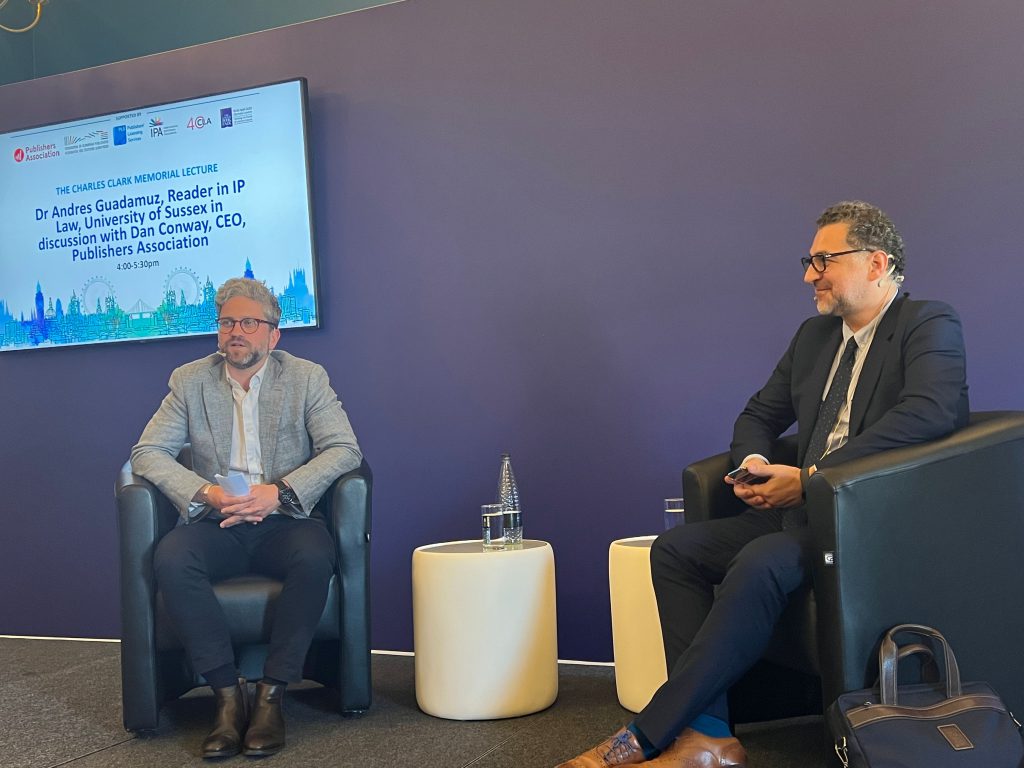This year’s lecture was delivered by Dr Andres Guadamuz, and followed by a fireside chat with Dan Conway, The Publishers Association CEO. In a fascinating lecture, Dr Guadamuz had the opportunity to evoke the work of Charles Clark when considering different copyright regimes around the world, noting Clark’s involvement in the development of the CDPA (1988).
Under the title ‘Do Androids Dream of Electric Copyright?’, Dr Guadamuz used striking AI generated images (often including Llamas, Dr Guadamuz goes by the handle @TechnoLlama on Twitter) to accompany his presentation. In his self-deprecating style as an AI TDM Copyright geek whose underground band just became famous, he focused on the questions around authors, authorship and what works can be protected.
Do you think publishing should be terrified?
Yes, but artists more.
Dr Guadamuz expressed his concern for individual creators but also specific professions within publishing, such as copy editors, as those most at risk from AI. Given the fact that AI companies are making wholesale copies of works he shared his belief that licensing would have to be the solution to limiting litigation, and that the most obvious place for this licensing would be at the input stage particularly around the content used to train AI systems. Professor Guadamuz underlined the relevance of upcoming court decisions in pending lawsuits, notably Andersen et al. v. Stability AI, Midjourney, and DeviantArt and Getty Images v. Stability AI, Inc., mentioning that Getty Images might seemingly be seeking a court ruling in the UK as well. Professor Guadamuz commented on the 2021 UKIPO announcement of a possible TDM exception for any purpose, not limited to scientific research, which was rightly rejected by Government in February this year. He also said the EU AI Act will be an important piece of legislation to watch out for.
Closing on the notions of copyright attribution, Dr Guadamuz affirmed that AI could surprise and delight but that he was troubled by the idea of giving rights to non-humans. At the same time, and despite these ethical concerns, he asked If you can’t tell whether something was machine generated then do we need a copyright police to check it was human made? He also envisioned future careers in prompt engineering.
It was a thoroughly successful lecture conducted to a standing-room only Focus Theatre before Dr Guadamuz headed of to another book fair, this time in Bogota.
For another review, see Gold Leaf here.
Previous Charles Clark Memorial Lectures :
2023 : Dr Andres Guadamuz
2022 : Professor Mark D. Cole, Media law specialist, University of Luxembourg
2021 : Judge Kathleen O’Malley (United States Court of Appeals for the Federal Circuit) and Dr Tom Chatfield (British author and tech philosopher), moderated by Florian Koempel (online)
2020 : –
2019 : Professor Daniel Gervais, Director of Vanderbilt IP Program, Vanderbilt Law School
2018 : Andrus Ansip, European Commissioner for Digital Single Market and Vice President of the European Commission
2017 : Judge Pierre Leval (United States Circuit Judge of the U.S. Court of Appeals for the Second Circuit) and Jon Baumgarten (former General Counsel of the United States Copyright Office) (report)
2016 : Professor Michael Fraser, Professor of Law at the University of Technology Sydney
2015 : Professor Lionel Bently, Herchel Smith Professor of Intellectual Property Law at the University of Cambridge
2014: Shira Perlmutter, Chief Policy Officer & Director for International Affairs at the USPTO
2013: Richard Hooper, Chairman of the Copyright Hub Launch Group
2012: Maria Martin-Prat, Head of the Copyright Unit, Internal Market Directorate General, European Commission
2011: Dr Francis Gurry, Director General, World Intellectual Property Organisation
2010: –
2009: Mary-Beth Peters, US Register of Copyrights
2008: Jukka Liedes, Director at the Ministry of Education at the World Intellectual Property Organisation

